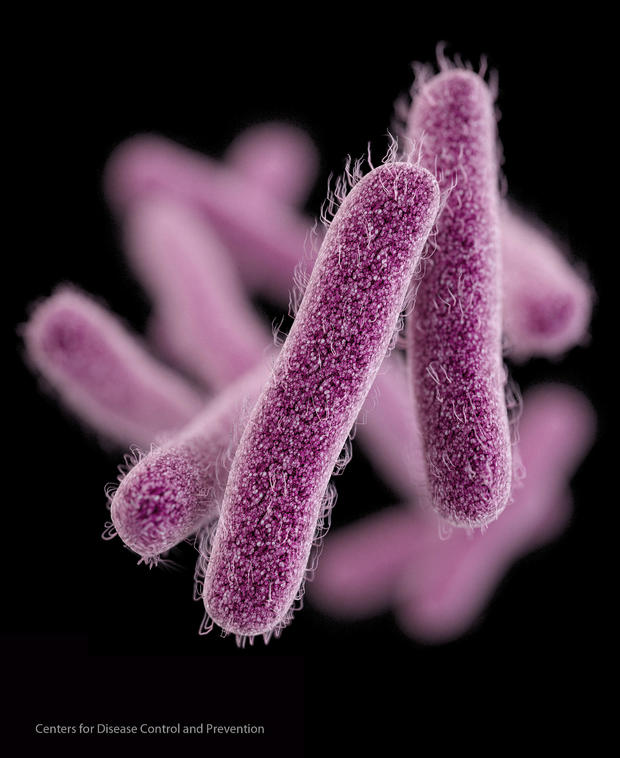CDC warns about drug-resistant stomach bug deemed "serious public health threat"
The Centers for Disease Control and Prevention says it is tracking a rise in stomach illnesses caused by infections with "extensively drug-resistant" bacteria that leave doctors with few antibiotic options to treat patients. The CDC warns it now poses a "serious public health threat."
Over the past few years, the CDC says there are signs the percentage of Shigella bacteria cases that are resistant to a broad swath of antibiotics has begun to climb steeply around the country. These strains can also spread their resistance genes to other stomach bugs.
Analyses of these bacteria, dubbed XDR Shigella, have shown resistance to all of the typically recommended frontline antibiotic treatments for bacteria: azithromycin, ciprofloxacin, ceftriaxone, trimethoprim-sulfamethoxazole, and ampicillin.
Outbreaks of Shigella bacteria often spread through contaminated food and water, via surfaces, or through sex. Symptoms of the disease it causes, a form of dysentery named shigellosis, include fever and diarrhea.
Shigella infections are commonly reported among young children. However, the CDC says data suggests that Shigella strains circulating in children so far are almost all susceptible to antibiotics.
Instead, most outbreaks of drug resistant strains have been reported among adults who are international travelers, men who have sex with men (MSM), those living with HIV or experiencing homelessness.
"The highest proportion of XDR cases are among adult men (85%). These trends are also consistent with recent increases in outbreaks of antimicrobial-resistant shigellosis among MSM," the CDC's Dr. Naeemah Logan said in a statement.
Many shigellosis cases resolve with rest and hydration. But especially without treatment, more severe cases can result in hospitalizations and death. The bacteria is estimated to rank among the leading causes of death linked to diarrhea around the world.
For patients with drug-resistant infections who need to be treated with antibiotics, doctors must seek out a handful of largely untested or typically unavailable options.
At a recent webinar, the CDC floated the drugs fosfomycin and meropenem as potential options which have been used abroad. However, officials acknowledged there was far from enough evidence for "official recommendations" by the agency.
States have reported 148 cases to the CDC from drug-resistant outbreaks. 39% of those cases have led to hospitalization. No deaths have been reported.
The CDC's alert comes after a 2015 warning by the agency that multidrug-resistant Shigella had first begun to spread to the U.S. from Americans who had traveled abroad.
The CDC says 5% of all Shigella isolates collected in 2022 were classified XDR, up from 1% in 2019.
"Given these potentially serious public health concerns, CDC asks healthcare professionals to be vigilant about suspecting and reporting cases of XDR Shigella infection to their local or state health department and educating patients and communities at increased risk about prevention and transmission," the agency said in an alert Friday.
As recently as last month, authorities had warned of an outbreak of hundreds of shigellosis cases in travelers returning from resorts in Cabo Verde across the U.S. and Europe. Last year, the United Kingdom had also reported "an unusually high number" of XDR shigellosis around the country.
Some state and local health authorities in the U.S. have also warned of cases in recent months, urging people to wash their hands and take other steps to avoid getting sick.
"We typically see Shigella cases peak in the summer months and decline in the fall and winter. However, Shigella activity increased in Fall 2022, and we are now seeing some antibiotic-resistant cases, which are confirmed via antibiotic susceptibility testing," Brian Spencer, a spokesperson for Colorado's Department of Public Health and Environment, said in a statement.
Spencer said cases have now slowed so far this year. However, authorities expect cases could again climb in the coming months. Colorado's cases have not been linked to the Cabo Verde outbreak.
At the CDC's webinar, a Colorado health official said that they had identified 17 cases in a recent multistate outbreak of XDR Shigella.
"Almost half were hospitalized. 82% were male and 59% of them reported being a man who had sex with men. 24% were experiencing homelessness, 29% reported drug use, and 59% were immunocompromised," said the Colorado health department's Rachel Jervis.




